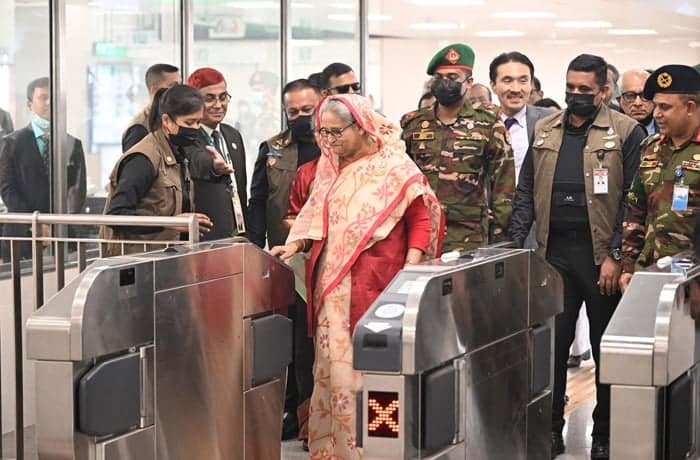Prime Minister Sheikh Hasina today inaugurated the country’s first elevated metro rail, marking another milestone in the country’s communication history six months after the inauguration of the Padma Bridge.
She partially inaugurated the 11.73 km Mass Rapid Transit (MRT) Line-6 of the Metrorail project from Diabari to Agargaon in the capital by unveiling a plaque at Diabari.
Prime Minister’s younger sister Sheikh Rehana was present at the inauguration ceremony. The Prime Minister also released a commemorative note of Rs 50 to mark the inauguration of the Metro Rail.
She addressed a civic gathering at the Diabari playground in the capital’s Uttara which turned into a huge gathering. Later, the Prime Minister is scheduled to go to Agargaon on her first official journey after buying tickets from Diabari in Uttara.
Starting from tomorrow (December 29), the general public will be able to ride the metro rail. Initially, the metro train will operate without any stoppage from Uttara Station to Agargaon Station from 8:00 am to 12:00 pm daily.
Bangladesh Road Transport Corporation (BRTC), a state-owned transport company, will operate 30 double-decker buses for passenger transportation from the metro rail stations. Among them, 20 buses will run on the Agargaon-Motijheel route via Farmgate, Karwan Bazar, Shahbagh, and Gulistan, while 10 buses will run from Uttara House Building to Uttara Diabari North Station.

Dhaka Mass Transit Company Limited (DMTCL), a government-owned entity, is implementing the metro rail projects. The Japan International Cooperation Agency (JICA) is constructing the metro rail and providing loans for the project.
Construction work for Line 6 of MRT began in 2016.
The second section from Agargaon to Motijheel and the third section from Motijheel to Kamalapur railway station will be operational in sequence. The metro rail will be launched from Agargaon to Motijheel in December. The metro rail will be able to carry 60,000 passengers per hour and half a million passengers per day, with a train arriving at each station every four minutes.
The elevated metro rail in Dhaka has introduced a new mode of invisible transportation, starting a new era of travel in Bangladesh. The metro rail will reduce congestion significantly by providing comfortable and fast transport at a lower cost.
In addition to increasing revenue collection, the operation of the metro rail will significantly reduce traffic congestion in the capital once it is fully operational.
According to the project details, initially 10 sets of trains with six coaches will run from Uttara to Agargaon. If any of the 10-set trains ever have trouble, the remaining two will run as backups. Trains will run slowly on this route for now. But when the train starts running at full speed, one train will run every three and a half minutes. It is not yet decided how long the train will stay at which station.
At every station, the train will wait until all passengers have boarded and disembarked. Each train can carry 2,300 passengers and travel at a speed of 100 to 110 kilometers per hour, except in areas with bends where the speed will be reduced. In 2009, the Awami League government took various initiatives to reduce pressure on the capital, including the construction of a metro rail. The project description states that the construction of the metro rail will alleviate transportation problems. Prime Minister Sheikh Hasina inaugurated the construction work of the Metro Rail project on June 24, 2016, which is known as the MRT Line-6.
Later, Road Transport and Bridges Minister Obaidul Quader inaugurated the first part of the elevated viaduct at Agargaon Point in the city and the construction of nine stations of MRT Line-6. Out of a total project of Rs 22,000 crore, JICA (Japan International Cooperation Agency) has provided about Rs 16,600 crore as project assistance.




